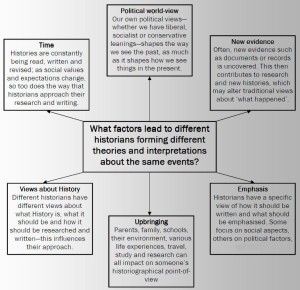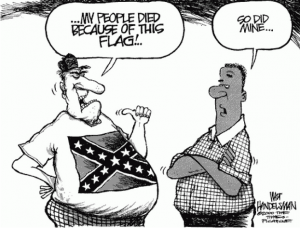Why does a historian have to understand what point of view is?

An of import challenge for history students is understanding the function of historians and working with historians to meliorate their understanding of the past.
Who are historians?
Historians are learned individuals who spend their professional lives researching and trying to make sense of the past.
Historians gather sources and evidence, which they use to form interpretations, conclusions and arguments. They publish their findings as academic works or books for the open market.
Most professional historians are employed in academia: every bit university or higher professors, lecturers or researchers. A few also work for authorities bodies, in the private sector or as publishing authors.
No historian 'owns the truth'
Considering they prepare written history and deliver it to us, historians play a critical role in shaping how we view and understand the by. No historian 'owns' or has a monopoly on historical truth, even so, even if they claim to.
History itself is not one single truth but a broad patchwork of ideas and viewpoints, woven by many different historians over long periods of fourth dimension. Every historian looks at the past from their own perspective, uses different sources, employs their own methods and speaks in their own voice.
Historians often attain different conclusions or answers from the same prove. There are several reasons for this.
Merely as you and other people run across the modern world in different ways, historians see the past differently. Every historian approaches the by with his or her own values, priorities and political perspectives. These perspectives shape the style we written report, interpret and brand sense of the past.
Political labels
You will often hear some historians mentioned with political labels – for example, "the left-wing historian Brown" or "Russell, a liberal historian". These labels attempt to summarise or encapsulate a historian's political perspective.
This is a simplistic and oftentimes problematic arroyo, however, considering information technology generalises or 'pigeon-holes' historians who may have significantly different viewpoints or arguments.
The most common of these labels attached to historians, as well as political commentators and other figures, are "left-wing" or "Marxist" and "right-wing" or "conservative".
In general terms, left-wing or Marxist historians tend to emphasise issues and bug affecting the lower classes. The about common of these are the ownership of wealth and majuscule, economic inequalities, class exploitation, the misuse of power and the condition and grievances of workers.
Historians with right-fly or conservative views may instead focus on economic liberty and opportunity, progress, social stability, police and social club and the failures of radicalism.
Somewhere between the two are liberal historians, who tend to focus on how well a society protects and advances private freedoms and rights. Some historians adopt even more complex or nuanced positions.
Why different conclusions?

Histories of a significant period or event will invariably incorporate a range of political perspectives.
Many left-wing historians propose the French Revolution, for example, merits it was driven past working-class dissatisfaction, the product of decades of feudalism, gross inequality and political exclusion.
In contrast, conservative historians suggest the French Revolution was triggered by exaggerated grievances and falsehoods; the revolution tried to achieve as well much as well quickly and descended into a series of vehement ability struggles.
Identifying perspectives
A difficult but of import challenge for history students is to identify and empathize these unlike perspectives and differentiate between them.
Students should too be aware of their ain values and political assumptions that shape the way you view and understand history.
For some insight into your own political perspectives, visit the Political Compass website, click on 'Have the examination' and complete the online quiz (it takes about 10-xv minutes). The quiz will provide a written and graphical assessment of your political views. It even charts your views in relation to some famous leaders, such as Adolf Hitler, Joseph Stalin, Margaret Thatcher and Mohandas Gandhi.
Changes over time

Time can also change the perspectives of historians. As the views and values of society modify and evolve, so do historians and their perspectives.
Historians of a detail generation may approach the past differently to their predecessors. They may study different people or groups, ask dissimilar questions, consider alternative causes and factors and form different theories. Historians who appoint in this are broadly referred to equally revisionists.
The last half-century or so has been a fertile period for historical revisionism. History is accessible to more people with different ideas, allowing for a greater exchange of information and a broader range of viewpoints.
Equally a consequence, ideas and approaches once rarely considered or countenanced by historians have been explored. Changes in social values have encouraged historical research from the perspectives of marginalised or excluded groups, such as women, homosexuals, colonised peoples and racial minorities.
It follows that history written, say, in the 1950s may be radically different to another written in the last decade. When studying a historian, it is useful to know when they were agile and the context they operated in.
Value and respect historians
Historians are the gatekeepers and architects of our history. Our agreement of the by is built upon their research, knowledge and hard piece of work.
It is important for history students to value and respect historians, even those who may non have or concur with. Utilise historians equally your guides as you trek through the by. Depict on their findings and their knowledge, use their writing as show and acknowledge them with referencing.
Exist aware, however, that no historian offers a definitive or perfect account of the past. Counterbalance up different perspectives and challenge historians yous disagree with. To a higher place all, recall critically not only well-nigh the past but as well the historians who reveal information technology to us.
Filter questions
Identifying a historian's arguments, perspectives or political position tin be difficult. Students should approach the writing of every historian with a critical middle. Think carefully about the assumptions they make, the conclusions they achieve and the theories or arguments they advance. The following filter questions might evidence useful.
| When was the historian active and writing about this history? |
| Can you detect whatever biographical information well-nigh the historian, such as their nationality, their education, their political views or affiliations? |
| Which particular periods, people, groups, events or ideas are the master focus of the historian'south piece of work? |
| What conditions or outcomes does the historian consider important? For case, practice they place more emphasis on economic outcomes than social improvements? |
| How does the historian describe and evaluate different people or groups? Does the historian sound positive or negative most particular people, groups or classes? |
| Does the historian express any value judgements or unfair assumptions most particular people, groups or events? |
| What style and tone of linguistic communication does the historian employ? Exercise they utilize emotive linguistic communication, exaggeration or hyperbole? |
| What evidence does the historian draw upon? What testify practice they overlook, refuse or downplay? |
| Does the historian form conclusions that are not supported by the testify? |
| What other historians does this historian reference? |
Terms for describing historians
The following terms can be used to categorise or summarise historians according to their general perspectives or arroyo. These terms should simply be used when speaking or writing about the broad history of a particular menstruation or issue. Students should avert attaching these labels to specific historians as this tin exist simplistic or misleading.
| bourgeois | As the proper name suggests, conservative historians tend to support the status quo, long standing traditions, social stability and gradual reform or change. They are disquisitional of excessive or unnecessary change. They are likewise negative about modify that does non savor consensus support, and tend to be hostile toward radical movements and events, such as revolutions. |
| determinist | Determinist historians believe that history follows a logical path, shaped past long- and short-term causes. They believe that every upshot is caused or determined (hence the proper name) by conditions or events that came earlier it. For case, determinists believe the Nazi movement in Deutschland was the production of German nationalism and militarism dating back to the mid 19th century. |
| feminist | Feminist historians investigate history from the unique perspectives of women. This is a relatively approach to history, dating from the mid 1900s. Feminist historians look at both prominent women and the lives and experiences of ordinary women. They likewise focus on how women were defined and constrained by patriarchal (male dominated) societies and power structures. |
| liberal | Liberal historians, like their forebears the Whigs, are mainly concerned with individuals and freedoms. For most liberal historians, the measure of a society is how well it protects and advances the rights and freedoms of the individual. Liberal historians are therefore interested in concepts such equally political participation, commercialism and the freedom of speech communication and thought. |
| Marxist | Marxist historians are influenced by Karl Marx'south theory of historical materialism, which asserts that lodge is defined by economic weather condition and that "all history is the history of class struggle". Marxist historians commonly focus on the imbalanced relationship betwixt wealth, power and labour, likewise as the weather and exploitation of the working classes. |
| postmodernist | Postmodernism is a complex academic and literary motility of the tardily 20th century. Postmodernism sees history not as a factual reconstruction of the past but a subjective intertwining of truths and literary fictions. Well-nigh postmodernist historians reject existing approaches to history and develop their own. They likewise endeavour to deconstruct existing assumptions about the by. |
| revisionist | Historical revisionism is the process of questioning and reinterpreting conventional knowledge about the past. A 'revisionist historian' does not refer to a detail position or viewpoint. Instead, a revisionist historian is ane who challenges existing agreement past offering new evidence, conclusions or arguments. |
| Whig | The term Whig describes political progressives who believe in the gradual improvement of human being society. Whigs believe that all societies will, given time, evolve into liberal democracies with constitutional regime and universal freedoms. Whig historians and their modern counterparts, the neo-Whigs, write history equally the story of human progress toward these goals. |
Sentence stems for historians
Discussing historians demands a particular writing style. Writing well-nigh historians goes beyond just quoting or paraphrasing their views. You must larn to summarise a historian'south conclusions while suggesting how or why they reached them. Yous should try to write comparatively and critically, weighing upward one historian against others and evaluating the validity of a historian'southward work. This section contains 25 sentence stems useful when writing about historians.
| According to Historian W, this event was caused by… |
| Like near historians of his era, P places emphasis on… |
| Historian Z is scathing nigh this activeness, describing it as a… |
| A more sympathetic view is offered past Historian I, who says that… |
| Relying chiefly on this bear witness, Historian V forms the assumption that… |
| Edifice on the work of Historian B, Historian West adds that… |
| The conventional view, expressed by historians like Chiliad and D, is that… |
| Historian R challenges this orthodox view, declaring instead that… |
| Echoing this position is Historian H, who also puts it downwards to… |
| Historian B views this with a more critical eye, suggesting that… |
| A more sceptical view tin can exist institute in the work of Historian G, who writes… |
| Dissimilar Historian K, Historian R places greater emphasis on… |
| Historian E rejects this assumption, suggesting instead that… |
| The position taken past Historian H is unsupported past testify… |
| This is a view contradicted past Historian C, who instead attributes it to… |
| Historian J instead condemns this, challenge that it… |
| Like other left-leaning historians, B describes this as a… |
| Expressing his usual antipathy for radicalism, Historian S states that… |
| Historian T, who emphasises the important of individual freedom, hails this event equally… |
| For progressive historians like G and O, this was an important accelerate toward… |
| For Marxist historians like W and L, this represented an important step… |
| Historians like F and 50 have launched a stinging attack on this theory… |
| While Historian W claims it every bit a victory, G argues that it… |
Other useful words and terms
The following words and phrases may exist useful when writing nigh historians, particularly in an analytical or critical style.
| adopts the position | advances the theory | asserts that | attempts to convince | claims that |
| contends that | contradicts | critical of | dismisses | downplays |
| embellishes | emphasises | evaluates | exaggerates | expresses the view |
| fails to consider | focuses on | ignores | launches an assail | makes a instance |
| makes the statement | never considers | obsesses well-nigh | 1 sided assessment | overlooks |
| overly critical | questions | rebuts | refuses to accept | refutes |
| rejects the view | seeks to bear witness | selectively uses | skewed perspective | shows bias |
| subjective | takes the view | treads lightly | weighs upward | would accept us believe |
Citation information
Title: "Working with historians"
Authors: Jennifer Llewellyn, Steve Thompson
Publisher: Alpha History
URL: https://alphahistory.com/working-with-historians/
Date published: November 23, 2019
Date accessed: March fourteen, 2022
Copyright: The content on this page may not be republished without our express permission. For more than data on usage, please refer to our Terms of Use.
Source: https://alphahistory.com/working-with-historians/
0 Response to "Why does a historian have to understand what point of view is?"
Postar um comentário